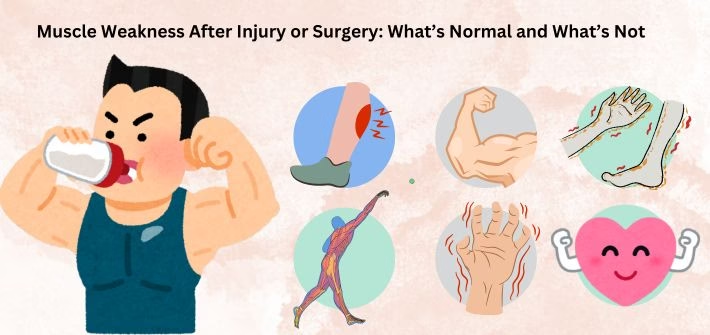It’s completely normal to feel tired or sore after an injury. And after surgery, you expect to take it easy for a while. But what if your muscles feel extra weak, or that weakness just won’t go away? It’s natural to wonder if this is just part of getting better or if something else is up.
Knowing the difference between regular muscle weakness and something more serious can help you heal the right way and stop problems from getting worse.
In this blog post, we’ll walk you through everything you need to know about the causes of muscle weakness and see what’s normal and what’s not.
Why Does Muscle Weakness Happen After Injury or Surgery?
The simple reason behind this is that when a joint or a muscle is hurt, the surrounding tissue tends to swell up, and this makes it move less. Your body attempts to restrict any motion in order to protect itself. This resting may weaken your muscles since you are not exercising them as often.
It is possible to have some muscles even left motionless after an operation (mainly bone or joint surgery), as you recover. This period of not exercising much is one of the major factors why muscles become weak after an operation.
While some weakness is normal, on some days it simply seems excessive, lingers much longer than necessary, or may indicate problems beyond the superficial, such as actual muscle loss, nerve damage, and so forth.
What Level of Weakness Is Considered ‘Normal’?
It’s normal to feel a certain amount of muscle weakness. Generally, you might notice:
- It’s hard to put your full weight on an injured joint or limb.
- Your movement isn’t as free as usual for a little while.
- You feel tired or stiff doing everyday things.
- Your muscles might “shake” a bit when you do light exercises early in recovery.
Most of these things tend to get better little by little with rest, physical therapy, or by carefully moving around. In fact, mild weakness that improves over time is often a good sign that you’re healing just as you should be.
When Muscle Weakness Isn’t Normal

Sometimes, muscle weakness can be a warning sign, telling you there’s something more going on than just regular healing. Keep an eye out for these things:
- No real improvement even after several weeks of getting better.
- Trouble using your arm or leg for simple, everyday tasks.
- You can see your muscles getting smaller.
- Feeling numb, tingly, or sharp, shooting pains.
- Feeling wobbly or unsteady when you walk or stand.
These could be clues to things like a nerve issue, poor blood flow, or significant muscle loss symptoms. And if that weakness is only on one side, keeps worsening, or pops up in places that weren’t even hurt originally, don’t wait – go get it looked at.
Common Causes of Muscle Weakness After You Should Be Recovering
There’s no single reason why muscles stay weak, but here are some of the most common causes of muscle weakness after an injury or surgery:
Disuse Atrophy (Muscles that are not in Use)
When a muscle is not used for a while, it begins to shrink. This is known as atrophy, and it can start to occur within a matter of days. It may require weeks or even some months of correct exercises or rehab to regain that muscle strength.
Nerve Problems
There are cases when the nerves adjacent to the injury site or where you had a surgical procedure become compressed or damaged. This may be due to the swelling, scar tissue, or even the complications of the surgery itself. The weakness may be significantly worse or may not improve with physical therapy when nerves are involved.
Healing Wrong or Out of Alignment
If bones or other tissues don’t heal in the right spot, or if you’re not putting weight on your body evenly as you recover, some muscles might try to work too hard while others stop working properly. This can lead to long-term imbalance and weakness.
Swelling or Ongoing Pain
Inflammation (swelling) or when you are in chronic pain, your brain may have difficulty commanding your muscles to work to their full capacity. The pain might even cause your body to be protective about the space, and movement is restricted to prevent the feeling of pain, which only adds to the weakness.
Becoming aware of the reason why your muscles are weak is the first step towards discovering the most effective method of treating them and restoring your strength.
How to Tell If You’re Dealing with Muscle Loss or Just Weakness
A lot of people use “muscle weakness” and “muscle loss” as if they mean the same thing, but they’re actually a bit different.
Muscle weakness means you have less strength or just can’t use a muscle like you normally would.
Muscle loss, on the other hand, is when the muscle itself actually shrinks in size – this is what doctors call atrophy.
Here’s a simple way to tell them apart:
| Muscle Weakness | Muscle Loss Symptoms |
| Muscle feels soft or shaky | Muscle appears visibly smaller or sunken |
| Strength goes up and down based on what you do | Consistently can’t lift or move things like you used to |
| Might be from tiredness or nerve signal problems | Often happens from not using the muscle for a long time or bigger health issues |
Sometimes, you might experience both at the same time, especially if you’ve had a body part still for a long while. If you’re noticing either of these, it’s really important to talk to a healthcare professional.
Rebuilding Strength Safely
You’ll be glad to hear that most muscle issues after an injury or an operation can be totally improved. What it really comes down to is giving it time, doing the smart exercises, and being consistent with your efforts.
Here are some practical tips to help you regain your strength:
Start gently: Stick strictly to your rehabilitation plan. Don’t push yourself back into intense activities too quickly.
Be steady: Doing small movements often is more helpful than occasional, super-tough workouts.
Fuel your body: Eating a balanced diet with enough protein gives your muscles what they need to repair themselves.
Pay attention to pain: Discomfort is your body’s way of telling you something. Avoid pushing through it without muscle expert advice.
Monitor your progress: Note down how things improve each week. This helps you catch any underlying problems quickly.
If you sense your strength isn’t returning, or you’re simply unsure what’s a normal part of healing, it’s wise to get professional advice. An early evaluation can significantly impact your long-term recovery.
Conclusion
Worrying about muscle weakness after an injury or surgery is totally understandable. But remember, not every bit of weakness is a bad sign or will stick around forever. Some of it is simply your body’s natural way of healing. Even so, knowing what’s normal and what’s not can help you take control of your health and avoid unnecessary delays.
If your symptoms stick around, or if something just doesn’t feel right, don’t wait to see a qualified professional. They can properly look for things like muscle loss or other hidden issues, and then guide you to regain your strength in a way that’s both safe and lasting.

